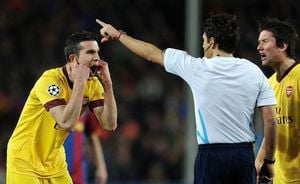Friedrich Merz, the leader of the Christian Democratic Union (CDU), has ignited controversy with his recent speech at the party's election campaign closure event held at Löwenbräukeller, Munich. During his address, Merz made provocative comments directed at left-wing voters and opposition parties, which have drawn sharp criticism from political opponents and social media users alike.
"Left is over. There’s no longer any left-wing majority or left-wing politics. It’s done. It can’t go on like this," exclaimed Merz, who could potentially become Germany’s next chancellor. He aimed to frame his party as the representative of the majority, claiming his politics would cater to the thinking populace, those who “still have all their cups in the cupboard,” and not for "green and leftist idiots" who supposedly have no place among the German populace.
Merz then posed a pointed question to demonstrators protesting against right-wing extremism: "Where were they when Walter Lübcke was murdered by right-wing extremists in Kassel?" This remark has been widely criticized for misrepresenting the public’s reaction to Lübcke's assassination, as his death had incited thousands to take to the streets to protest against right-wing violence.
Such rhetoric has not only polarized the discourse but also prompted fierce condemnation from political leaders. Lars Klingbeil, co-chair of the Social Democratic Party (SPD), accused Merz of deepening societal divides just before election day. "Friedrich Merz is deepening the trenches within the democratic center of our country," he said on social media platform X. SPD General Secretary Matthias Miersch echoed this sentiment, asserting, "Instead of seeking unity, Friedrich Merz opts to sow division. That is not the voice of someone who wants to be chancellor for everyone—it's the speech of a mini-Trump."
Critics have not held back when discussing the implication of Merz's statements. Many argue his approach alienates millions of citizens who identify with leftist views and reinforces the notion of exclusion within German politics. Maja Göpel, a futurist and scholar, found Merz's comments to be "seriously disturbing," highlighting the danger of labeling nearly 45 percent of the electorate—opposed to the estimated 35 percent who vote for right-extremist parties—as 'not able to think straight'.
Merz's comments represent more than just one speech; they suggest significant ramifications for future coalition negotiations, especially if the CDU finds itself seeking partnerships after the elections. Current polling indicates the CDU’s viability is tenuous without forming alliances with the Greens, which Merz and CSU leader Markus Söder have vehemently opposed. Söder, sharing reminiscent sentiments, targeted the Greens, emphasizing no coalition with them, hinting at the prevailing tensions within German politics.
The CDU’s chances of forming government post-election are clouded, with potential coalition partners like the SPD being discouraged by Merz's inflammatory discourse. Even the prospect of securing enough votes to form a stable government looks uncertain amid the divisive rhetoric. The political climate is exceedingly volatile, and the backlash against Merz's comments leaves many questioning the potential for cohesive governance moving forward.
With the elections rapidly approaching, the stakes have never been higher. Voters across all parties are bracing for what could be one of the most contentious periods of modern German politics. Whether the CDU can recover from this backlash under Merz’s leadership remains to be seen. His recent remarks may well reverberate through the political discourse for some time, impacting not only the current election but also shaping the future of German politics.
Political analysts are closely watching how the dynamics will shift as parties gear up for the election, especially with Merz at the helm. His intentions to unify voters under the CDU banner face serious challenges, and the division he might have worsened could haunt the party long after the votes are counted.



